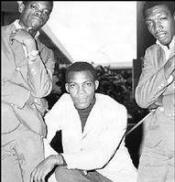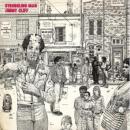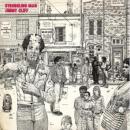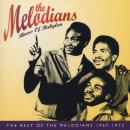Get up in the morning, slaving for bread, sir
so that every mouth can be fed
Poor, poor me, the Israelite, aah-ah
Get up in the morning, slaving for bread, sir
So that every mouth can be fed
Poor, poor me, the Israelite, aah-ah
My wife an’ my kids, they pack up an’ a leave me
Darling, she said, I was yours to be seen
Yeah, I said poor me, the Israelite, yeah yeah
(I gotta tell you) My shirt dem a-tear up, trousers are gone
I don't want to end up like Bonnie and Clyde
Oh-oh poor me, the Israelite, yeah yeah
(I gotta tell you) After a storm there must be a calm
Catch me in the farm, you sound your alarm
Poor, poor me, the Israelite, yee
Yeah, yeah!
(They said) Get up in the morning, slaving for bread, sir
So that every mouth can be fed
Poor, poor me, the Israelite, aah-ah
My wife an’ my kids, they pack up an’ a leave me
Darling, she said, I was yours to be seen
Yeah, I said poor me, the Israelite, yeah yeah
My shirt dem a-tear up, trousers are gone
I don't want to end up like Bonnie and Clyde
Oh-oh poor me, the Israelite, yeah yeah
After a storm there must be a calm
Catch me in the farm, you sound your alarm
Poor, poor me, the Israelite, yee
Poor me, the Israelite.
I wonder who I'm working for.
Poor me, Israelite,
I look a-down and out, sir.
so that every mouth can be fed
Poor, poor me, the Israelite, aah-ah
Get up in the morning, slaving for bread, sir
So that every mouth can be fed
Poor, poor me, the Israelite, aah-ah
My wife an’ my kids, they pack up an’ a leave me
Darling, she said, I was yours to be seen
Yeah, I said poor me, the Israelite, yeah yeah
(I gotta tell you) My shirt dem a-tear up, trousers are gone
I don't want to end up like Bonnie and Clyde
Oh-oh poor me, the Israelite, yeah yeah
(I gotta tell you) After a storm there must be a calm
Catch me in the farm, you sound your alarm
Poor, poor me, the Israelite, yee
Yeah, yeah!
(They said) Get up in the morning, slaving for bread, sir
So that every mouth can be fed
Poor, poor me, the Israelite, aah-ah
My wife an’ my kids, they pack up an’ a leave me
Darling, she said, I was yours to be seen
Yeah, I said poor me, the Israelite, yeah yeah
My shirt dem a-tear up, trousers are gone
I don't want to end up like Bonnie and Clyde
Oh-oh poor me, the Israelite, yeah yeah
After a storm there must be a calm
Catch me in the farm, you sound your alarm
Poor, poor me, the Israelite, yee
Poor me, the Israelite.
I wonder who I'm working for.
Poor me, Israelite,
I look a-down and out, sir.
envoyé par Dead End - 20/7/2012 - 11:35
×
![]()








Scritta da Desmond Dekker e Leslie Kong, è stato il brano più famoso per “Desmond Dekker & The Aces”, il gruppo del grande musicista giamaicano scomparso nel 2006.
Inclusa nella riedizione 2003 della colonna sonora nel film “The Harder They Come” del 1972, quello interpretato da Jimmy Cliff.
Nel 1989 il regista Gus Van Sant la volle come tema musicale principale nel suo bellissimo “Drugstore Cowboy”, con Matt Dillon, Kelly Linch ed il grande vecchio William Borroughs.
“Sono costretto a buttarmi giù dal letto tutte le mattine per lavorare come uno schiavo, signore, che ho tante bocche da sfamare, ma è stato tutto inutile, signore, mia moglie ha preso i miei figli e mi ha lasciato, povero israelita che sono! La mia camicia ed i miei pantaloni ormai sono a brandelli ma non voglio darmi al crimine e finire malamente, crivellato di colpi come Bonnie e Clyde. Eppure tu, signore, hai dato l’allarme perché mi hai sorpreso nella tua fattoria a rubare qualcosa da mettere sotto i denti, povero israelita che sono! Dovrà pur esserci un po’ di pace anche per me, povero israelita! Non so nemmeno per chi e per cosa lavoro, signore, mi sento davvero male, povero israelita che sono!”
Una personale e libera traduzione solo per spiegare che questa mitica canzone del grande “King of Ska” giamaicano è secondo me da ascriversi a buon diritto al percorso sulla guerra dei 100.000 anni che i ricchi fanno ai poveri
Titolo e ritornello hanno a che vedere col “rastafarianesimo”, movimento culturale e spirituale dalla storia piuttosto complessa (per cui rimando a wikipedia) che ha a che fare con la tradizione religiosa ortodossa etiope di origine ebraico-cristiana, con l’esilio del re d’Etiopia Selassié dopo l’invasione fascista e con la predicazione radicale del sindacalista e scrittore giamaicano Marcus Garvey. Sostanzialmente – e semplificando – ogni rastafariano giamaicano si ritiene un esule perché la sua patria è l’Africa, l’Etiopia, perché il suo Cristo, identificato nel re Selassié, fu esule a sua volta e questa ricorrente tematica è assimilata all’esilio ebraico in Babilonia (così come in un’altra celeberrima canzone reggae, “Rivers of Babylon”)